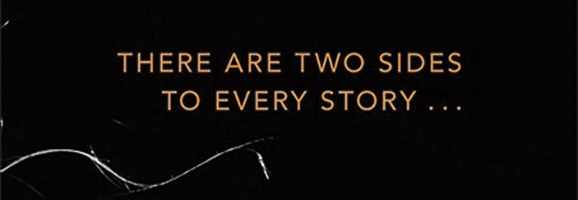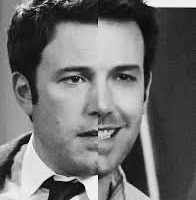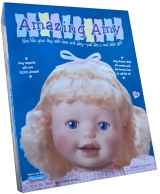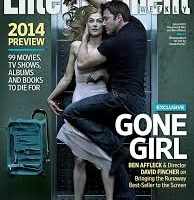Gone Girl: The Complexity of Human Behavior

Gillian Flynn’s name has been placarding book stores all over the world for a while now and pretty soon, it’s going to take a tour around the silver screens as well. It was Flynn’s novel Gone Girl, published summer 2012, that put the former journalist’s name on bestseller’s lists and secured her a movie deal. The intense and mysterious crime drama is a maze of different points-of-view and two kaleidoscopic main characters that are never actually the people they try to be. Gone Girl observes the unraveling of a long-time relationship that starts out as your romantically comedic love story and ends up as the opposite.
In the center of the story is the disappearance of Amy Dunne, (house-) wife of Nick Dunne, famous for being the inspiration for her parent’s successful children’s books “Amazing Amy”. Via Amy’s diary entries, we find out that when the couple moved to Nick’s home town in Missouri, their marriage took a u-turn. Back in New York, it was the perfect love story, the perfect couple – the perfect marriage. After the cracks in their relationship have grown enormous, Amy disappears. Quickly, the media and police suspect Nick of murder – after all, it’s always the husband. Amy’s (undiscovered) diary adds to the reader’s suspicions, while other details speak against it– against any murder at all.
What’s particularly interesting about the characters of Nick and Amy, is that the reader is led to believe that they are certain people that they actually aren’t. Nick seems to be either The Perfect Husband or the Murderer, while Amy seems to be the Cool Girl and the Victim. There are different reasons for this, depending on which of the two one is focusing. Let us take a look at each character separately.
The Husband: Nick Dunne

It’s always the husband, so this time it can’t be. Although Nick Dunne is a dishonest character, the reader will not immediately believe that he killed his wife. Diary Amy makes him look like a variation of the prince on a white horse by painting him as a nice and flirty man. He is the love of her life and saves her from a dull single life in New York. While Diary Amy recounts those days “back when”, Nick discovers that his wife has gone missing, so there is a back and forth between these two time lines and points-of-view. Although Nick lies to the police a few times, one accepts his insecurity as a normal flaw. It seems like he doesn’t want the police to know about his wretched marriage.
When the media gets involved in the case, Nick’s behaviour starts to become alien. He seems happy and flirty – the same man Amy describes in her diary. Knowing of their troubled relationship, we assume that he is going back to his “normal self” after the disappearance of his wife. While the media interprets this as suspicious, we accept that Nick just doesn’t know how to act in public and how to express his emotions fittingly. Even though this inability act “normally” does not really fit with the confident persona of early Diary Nick, there are several points that support our assumption: Nick has had a big life change moving to a small town and becoming a professor, while his marriage has been rough. This supports the picture of a confused and troubled man.
As the pages continue to turn, Nick for his part turns into a moron. This development is mainly triggered by Diary Amy’s narration of how Nick decided for the couple to move away from New York. According to the diary, Nick he changed into a loveless, cold and distant husband in Missouri. There is more though; Nick lies about more important things like his alibi and secrets are discovered by both the police and the reader. The fact that the book hides these secrets from us for so long makes it seem like Nick has been hiding them from us. He becomes untrustworthy – suspicious. And we start asking ourselves: Isn’t it always the husband?
The Wife: Amy Dunne

The first variation of Amy that the reader meets in the book is Diary Amy, or rather Diary Amy #1. The first entries go as far back as five to six years before Amy’s disappearance, when she was still a single New York writer, frustrated by her controlling parents and men. Nick is her rescue and the two spend some heavenly years together before the recession hits and both lose their jobs and home. In these early years, Amy is a weirdly perfect female character, although she’ll later describe this persona as the ‘cool girl’. This is a character she invented for herself to play. Cool Girl is not very jealous, does not control every single step her husband takes and she’s always happy and friendly.
The move to Missouri transforms Amy into a house wife. Flynn manages to let this transformation look inevitable, as if it were forced on Amy. At the same time, she’s not a damsel in distress. Her depression (because that’s what her behavior adds up to) seems genuine, an actual sickness triggered by her husband’s estrangement. Furthermore, the South has been hit badly by the recession too, so there isn’t actually any option for Amy to work. As is found out, she builds herself a life of her own with a few new friends, while starting to wish for a baby.
All the while, Nick paints a different picture of his wife’s character; she’s a controlling, self-righteous narcissist with twisted morals. Following the pattern in his character development, this starts out as being possible and then becomes less likely with every page. As Nick gets less sympathetic, Diary Amy gets more realistic. In the end, her subtly growing fear of her husband and the coldness with which he treats her (in the diary) add up to the suspicion that Nick killed his wife. We do not believe Nick’s description of his wife, but Diary Amy’s.
The Real Nick and Amy

The last third of the novel has a couple of twists that I shall not spoil in this article, but I’ll say this much: we discover both who the real Nick is and who the real Amy is. For some part, they are what they seemed to be at various points in the story. This is particularly true of Nick, who is far from being a prince on a white horse or perfect in any other way. However, he is not a moron in every aspect. The impression we got of him in different parts of the book are like impressions we get from other people in real life. We judge people by fragments, never being able to know who they are deep down. Amy knows the real Nick though and he knows the real Amy — who, by the way, isn’t Diary Amy if you haven’t figured that out. The fragments we get from her life are less random and unintended than Nick’s – in fact, their character arcs are opposites in this way. Yet, they are similar in luring the reader into believing that this is what these characters are like.
It’s an easy assumption; after all, in most other books the characters are written in the way they “really” are. Or in the case of mysterious characters, you only get fragments of them, but at least of their “real” persona. In this way, Gone Girl is a reminder of how complex the human mind is both in interpreting and executing different patterns of behavior.
What do you think? Leave a comment.











Reading this in first person narrative meant being in the thoughts of 2 very sick people the whole book and it left me feeling yucky.
There is very little I can comment about this book without there being some sort of spoiler. All need to say is, can’t wait for the movie adaptation.
We would love to hear a follow-up on this.
The story is clever… maybe too clever? The point of view characters are smart – smart ironic, rather than emotionally intelligent.
This is a first class book.
I loved the concept of the book it really pulled me in but I really didn’t get what I expected. The ending is horrible and I feel like I was cheated of a true ending.
I’m a huge fan of Flynn. I loved Dark Places and is one of my favourite reads of 2012. Sharp Objects was okay psychologically, but I was so disappointed by the mystery and didn’t care about the characters. Still, I’ve read far worse.
Sometimes being disturbed is a good thing.
I have to be frank….the writing is fantastic….I have to be frank again….this book pissed me off…
Very creative prose and storyline, very smart. Can the movie come already.
Just finished reading Gillian Flynn’s latest tour de force. Need a few minutes to gather my though…! I’m very curious to see what they make of the film.
I was so disappointed by this book! The first (of three) parts is ok: dark, suspenseful, well written, and contemporary feeling. Part two delivers a satisfying, if kind of obvious, twist. Part three devolves into this one-dimensional, cartoonish descent into over-the-top evil!
I’m so excited for the movie adaptation. Good job on your article. It was an insightful and engaging read!
Character complexity is what gives them life–and perception is a wonderful thing to play with as a writer. If this doesn’t translate over to the big screen, it makes it hard to enjoy. I haven’t seen it yet, but I plan to do so. The good news is that my friends have told me “Gone Girl” ranks on their favorite movies of 2014 list! Along with their praise and your article, I’m dying to know the outcome of the mystery.
If I’m honest, I’m not entirely convinced by Flynn’s writing style. and this book was a pretty gruelling slog, mainly due to the fact that I hated both Nick and Amy. That said, I can’t wait to see the film!
The book basically leaves you feeling icky and pissed and confused and really really pissed and utterly impressed.
For me personally, the end was a big letdown. I don’t like. I am sad that I wasted time on this.
I am the sort of person who annoys my husband by leaning over in my theatre seat ten minutes into Sixth Sense and saying, “What do you want to bet he’s dead this whole time?” So I did find parts of this book predictable (the midpoint twist seemed obvious ten percent of the way in, and I had the ending somewhat pegged by the 80 percent mark).
This is a sticking book and one you want to talk about because there is so much to discuss, so I can see why you wrote this. Great read.
This got me so excited for the movie. IO have not read the book yet.
I cannot truly convey the sick and twisted mindset that goes on in this story.
Great article, I enjoyed reading your take on the novel. I’m looking forward to the film coming out but at the same time anxious about it – I think it will be difficult to adequately portray the complexity of the narrative turns on the big screen. Not being able to experience the plot ‘in their heads’ will make a big difference to the story overall.
I’m such a huge fan of “Gone Girl” for precisely the reasons you brought up in the article. I found myself quite surprised by the film, not by the plot as I read it beforehand, but because of the dark comedy that was brought into it.
I have not seen the movie yet, but I enjoyed the book because of the unreliable narration. I am interested to see how they present the two points of view in the film.
Ever since I finished reading Gone Girl, it seems like I’m seeing it everywhere.
I’m really looking forward to this movie! great article
I work at a movie theater, and with the recent release of the film adaptation I have been meaning to pick up a copy of the book before I see the film… and this may be the last push I needed! excellent piece, thanks for sharing!
I was captivated by this book and cannot wait to see the movie! The characters were both so unlikeable and twisted, yet even though I despised them both, I still found the story suspenseful and compelling. Great article!
Good article, I just watched the movie the other day and now the book is on my two read list. It was a very good movie, well thought out and I understand what you mean about the different sides of the characters, it is a unique way of providing that. Interesting read, well done!
Great article! Very concise and interesting, well done! The film and novel work in vastly different ways. Despite both telling the same visceral and distressing narrative, the film embraces the news media’s long-lasting effect on the mystery. Meanwhile, the book takes enough time to chart the steadily declining central relationship.
Gillian Flynn is an expert at character development, so much so that she was able to create two distinct characters within each individual. To me, this is a talent and you have thoroughly addressed the “two sides” that were presented to the reader. You also bring up an interesting discussion of reality vs. what people can make people think that they are, which are two very separate things. I really liked this article and I look forward to seeing this movie!
Exceptional book!
This was a great breakdown of the characters within this best-seller novel. It was interesting to read your point of view on each of them as their own person. Great interpretation!
I haven’t read the book nor have I seen the movie. But your article had me trying to figure out whether Nick murdered Amy or if that was what Amy wanted everyone else to think with out being told any details. This article is great in pointing out the varying personalities that make up the human character as a whole. Well done! Now, I’m definitely going to have to invest some time in either reading the book or watching the movie…
I really loved your article. Your thoughts were well-organized, and you’ve got a clear handle on the story of Gone Girl. However, I feel like the title could be tweaked to better represent the actual article. I went into this page thinking I would be getting a more in-depth incision to the novel as it relates to the “Complexity of Human Nature.” Basically, your article was just a well-written overview of the novel using Nick and Amy as sectional pieces. There’s nothing wrong with that at all! I’m just saying, the title was a little misleading, but that’s just me! Great article, and I loved Gone Girl (the beginning more so than the ending).
Awesome article! Never read it, but I look forward to reading it and maybe watching the movies.
It’s almost impossible to write about a novel like Gone Girl without spoiling the surprise plot twist. I appreciate the way you speak generally about the book and would be curious to know how you reacted to the film adaptation.
First of all, I want to say that I really enjoyed your article. I recently finished Gone Girl and I found it very interesting how the author was able to intertwine the two identities of the character. I think you explained it perfectly; Nick, the perfect husband versus the murder and Amy, the cool girl versus the victim. The portrayals of the characters really made me think about identity and our perceptions of self. Specifically with Amy, she explained throughout how she changed her identity based on the people she came in contact with. Essentially, she was giving a theatrical performance and presenting different ideas of self/who she “was.” Amy was constantly trying to control or guide how people perceived her. The second thing that stood out to me was the deception in the relationship. The lies in their relationship kept building upon each other as the relationship progressed. If this was a real relationship (and I am sure something like this has happened!), it would be interesting to see how dealing with the deception—whether actual or perceived—effects them on a conscious and subconscious level.
I was debating reading this, but after your article, I think I’m going to!
I love this book and the film adaptation. I love what you said about the fact that it’s always the husband, so it can’t be this time! I have to admit, I was convinced that Nick was the culprit, but as the story unfolds, I end up feeling so sad and hopeless for him in the end.
I am missing you a bit when you say ” Although Nick Dunne is a dishonest character, the reader will not immediately believe that he killed his wife.” One of the things that floored and excited be about this book is that even though I was reading from Nick’s POV, I wasn’t sure if he did it or not! Narrative was such an important motif in the novel. Not just the narratives we tell to others (wives, sisters, police investigators) but also the narratives we tell to ourselves about who we are. The third act shows a literal realization of that idea. There is no “true self” only the self we create to be agents in society. I love that Gillian Flynn chose a heterosexual relationship as the setting for her novel. The “cool girl” monologue is perfection at exposing the cutting misogyny that turns women in heterosexual relationships from people into tropes.
I think that Flynn did an amazing job of captivating my attention for the first 3/4’s of the book. However, I was extremely disappointed with the ending. It felt cheap, rushed, and more or less, like she had run out of ideas and just wanted to meet a deadline. The ending was way too unrealistic and exaggerated.
great article. The accuracy of the title is what drew me into to reading this article. I felt ‘Gone Girl’ had presented so many human conditions, emotions, and personas that everyone could relate to in some way. That’s exactly what I loved about the novel was that I found myself relating to certain narratives. Excellent book and article.
Nicely organized essay that–I’m glad–doesn’t include spoilers! Well laid out and provides a solid basic understanding of the characters and persons involved. Now I want to read the book and see the movie.
Great article and great understanding of the text. Their multiple personas are intensely interesting and has me wondering about how as individuals we even characterize ourselves in fragments.
Excellent comparison of the two characters. A whole article could be written solely on the role of unreliable narrators. There have been plenty of books with one unreliable narrator; this story, however, has two, making it even more frustrating for some readers and even more intriguing for others.
The movie was great! I need to check out the book.
Quality understanding of all aspects involved – we won’t talk about the movie’s underwhelming ending. It, unfortunately, needs the book to be understood well. I also think that Amy sinks into more than depression when she leaves New York, and that it’s a kind of mania that drives her to do what she does.
Honest Trailer’s coverage of Gone Girl provided a good comedic summation of the movie.